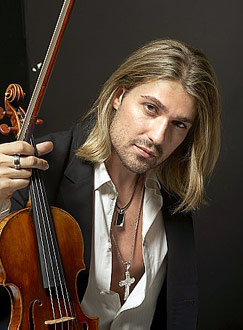
More Classical Crossover on the Horizon
Violinist David Garrett. Classical listeners are in for a good deal of crossover this week, beginning tonight with a return appearance at the Broward Center by German-American violinist David Garrett, who is fond of playing tunes by Metallica and the like in his high-energy shows.
But he’s also quite capable of playing straight classical, and certainly has the pedigree for it, having studied with Itzhak Perlman and other fiddle luminaries. I don’t know whether there will be a whole lot of classical in his show, but judging by the videos I’ve seen of him, he is a player with a big technique who should be able to make a strong impression.
Coming this weekend, on the same New World Symphony program as the Mahler Fifth, Jeremy Denk will play the Piano Concerto of Aaron Copland, written about the same time as the Concerto in F of his slightly older contemporary George Gershwin, but in some ways taking the same approach: How do we take this venerable European form and make it reflect our own country?
The concerto has a mixture of styles that in some places looks forward to the Copland of the late 1930s and 1940s, and in others, particularly at the beginning of the second movement, it’s more or less quoting the jazz that was so popular then, especially in France, where Copland had just finished studying with Nadia Boulanger. It’s an interesting piece that deserves more play, and the New World will perform it Saturday night and Sunday afternoon at the Knight Concert Hall.
Meanwhile, the Miami Symphony Orchestra features For the Heroes, a double concerto for violin and cello written in 2001 by Mark O’Connor in honor of the rescue teams that worked Ground Zero after the Sept. 11 attacks. On his YouTube channel, O’Connor and Israeli-American cellist Maya Beiser talk about the piece, and can be heard playing it with the Brooklyn Philharmonic.
O’Connor is one of the leading crossover composers of our time, writing and playing music that fits in the worlds of country roots music and classical. This concerto is a good example of the kind of stylistic mixing he likes to pursue, and it’s a mix that appeals to a lot of younger composers, according to what I’ve heard lately.
Also on the programs for Saturday night at the Lincoln Theatre and Sunday night at Gusman Hall are the Dvorak Seventh Symphony (in D minor, Op. 70), and On Hearing the First Cuckoo in Spring, a tone poem by the British composer Frederick Delius, who lived near present-day Palatka for a couple years in the 1880s, trying to make a go of an orange grove.
Violinist Daniel Andai and cellist Ashley Garritson are the soloists with the Miami Symphony in the O’Connor concerto.
All of these concerts will provide a good way to hear American musicians in their quest to draw on the Western instruments and European heritage they know and love and combine them with something distinctive and homegrown to reflect their times. Whether or not the music lasts and says something to future audiences is not something we can know, but it’s where we can hear a new kind of music being made, and that’s always exciting.